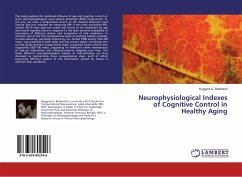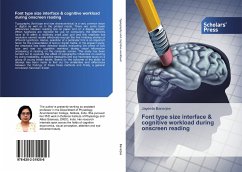
Neurophysiological Indexes of Cognitive Control in Healthy Aging
Versandkostenfrei!
Versandfertig in 6-10 Tagen
27,99 €
inkl. MwSt.

PAYBACK Punkte
14 °P sammeln!
This study explores the combined influence of age and cognitive control on three electrophysiological event-related potentials (ERPs) components. To this aim, we used a computrized version of the classical Wisconsin Card Sorting Task test, adapted for measuring ERP. A very early cue-locked P50 activity (40-70 msec post-cue onset) was found to be modulated by age and overall cognitive status in response to the mere sensorial probability of occurrence of different stimuli, and irrespective of task conditions. In contrast, one of the first computational steps of working memory (namely, context-up...
This study explores the combined influence of age and cognitive control on three electrophysiological event-related potentials (ERPs) components. To this aim, we used a computrized version of the classical Wisconsin Card Sorting Task test, adapted for measuring ERP. A very early cue-locked P50 activity (40-70 msec post-cue onset) was found to be modulated by age and overall cognitive status in response to the mere sensorial probability of occurrence of different stimuli, and irrespective of task conditions. In contrast, one of the first computational steps of working memory (namely, context-updating), putatively indexed by cue- locked P300 activity (320-430 msec), was preserved in both older and low-control adults. Conversely, low control adults showed comparatively larger cue-locked fronto-central slow negativities (500-700 msec), suggesting an inefficient online maintenance of task-set information and stimulus-response mapping over time. The three different neurophysiological indexes of task-switching are thus discussed as representing three computational steps, each of which processing different aspects of the information carried by stimuli in different task conditions.












